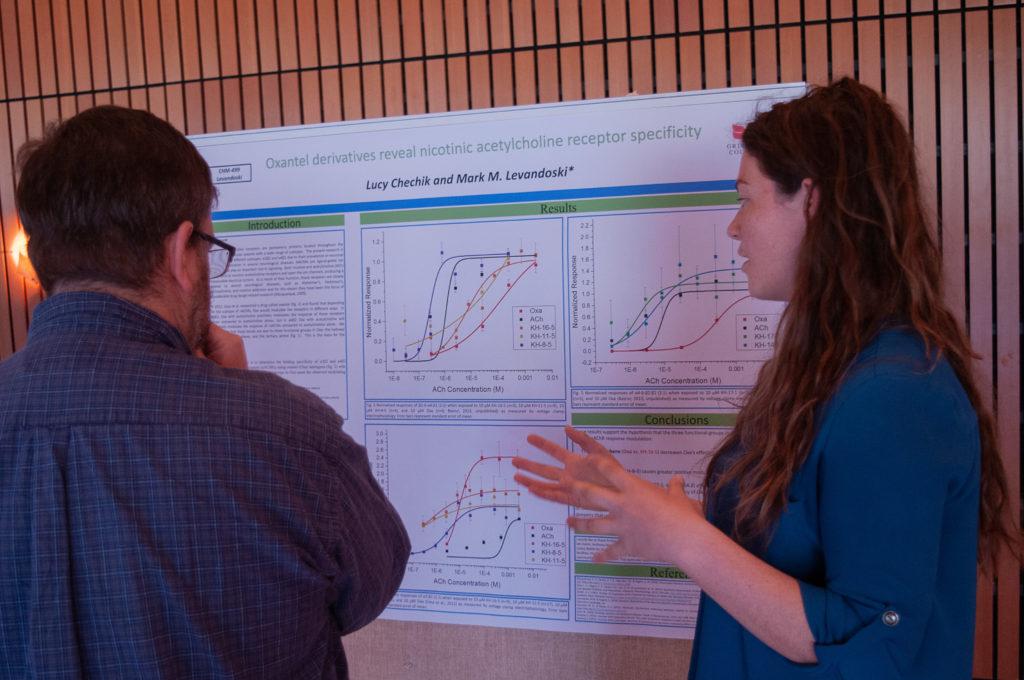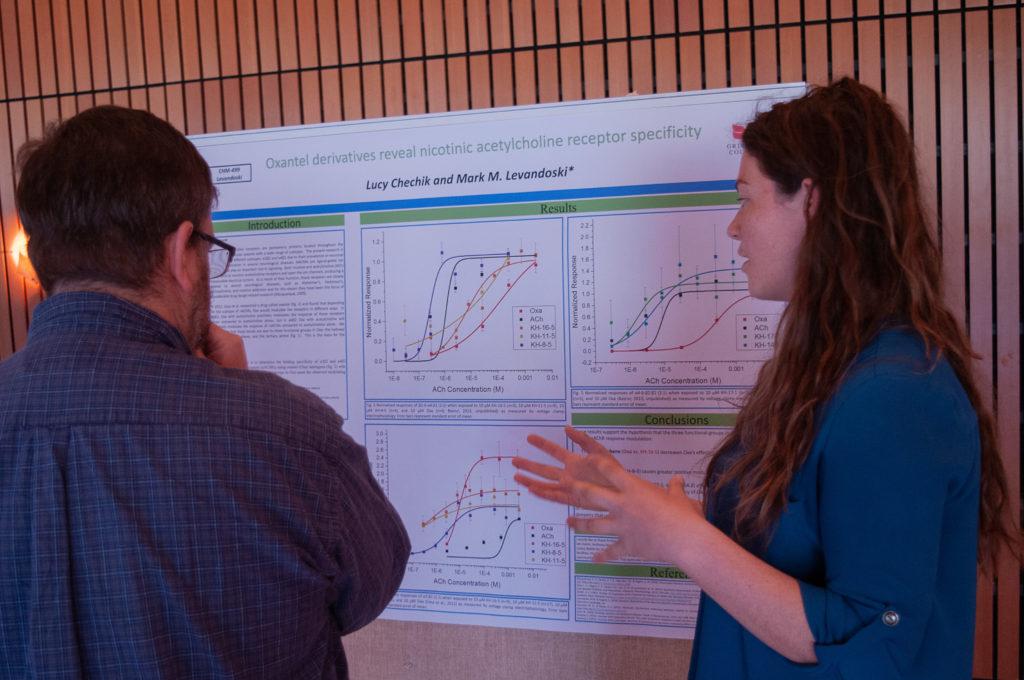Grinnell College’s third annual campus-wide student Research Symposium was held April 16 through 19. Featuring the work of 104 individual third and fourth year students, the symposium took the form of numerous panels, poster sessions and performances.
“Grinnell College seeks to ensure that every Grinnell student has the opportunity to engage in research. Towards this end, our Faculty have engaged in thoughtful conversations about their majors and fields so that the skills needed to carry out research are scaffolded across the curriculum,” wrote Professor Maria Tapias, anthropology, a coordinator of the symposium, in an email to The S&B.
Professors Jackie Brown and Wayne Moyer, biology and political science respectively, and Lesley Wright, Faulconer Gallery director, opened the symposium. Brown and Wright spoke about the Faulconer Gallery exhibit, “Making Life Visible,” a collection which they co-researched and curated and which incorporates biology and art, their respective fields of study, while Moyer spoke on his work on policy research. The event foreshadowed potential career opportunities in which undergraduate research may aid and served to exemplify the importance of research and the breadth of forms it can take.
The symposium allows for students to share their research, exhibiting techniques they have learned at Grinnell. The projects which students engage in are either of their own design, or that of a faculty member. About half of the research presented resulted from Mentored Advance Projects (MAPs) and other research projects were derived from courses, seminars and a book club.
Similar research topics were organized into panels, featuring two to four students who presented their work, often reading their research paper aloud, which was followed by time for questions from the audience. Panel titles included “Gender and Agency,” “Health, Racism and Policy in the United States,” and “Religion and Otherness.”
Ric Tennenbaum ’18 presented her paper, “The Pedophile, the Family, and Sustaining White Supremacy” on the panel entitled “Terror,” along with Bailey Bagneris ’19, “The McCarthy Front: U.S. Subversion of Radical Black Activism from 1940 to 1960,” and Lucy Bales ’18, “The Impact of U.S. Troops on Terrorism.”
After reading her paper aloud, Tennenbaum reflected on the opportunity the Research Symposium had given her to share her work. At the undergraduate level, much of the research done is experimental and highly interest driven, allowing for students like Tennenbaum to explore topics of unique interest. Tennenbaum shared that she does not plan to publish her paper anytime soon for its provocative take on the pedophile and the family as tools through which white supremacy is sustained. Tapias wrote that if a student chooses to pursue publishing their work, “The College also provides funding for students to disseminate their creative and scholarly beyond our own symposium, including regional, national and international venues.”
In contrast to the panels, poster sessions allowed student-researchers to share their work with viewers in a one-on-one environment.
Luke Jarzyna ’18, Sunny Zhao ’18 and Anne Rogers ’19 along with Professor Tony Perman, music, conducted a research project entitled “The American Mbira,” which they presented during a poster session during the symposium. The project focused on the Zimbabwean instrument, mbira, which all three students have been playing for pleasure over the past four or five semesters.
Over spring break, the three students traveled to Oakland, California, staying with a Zimbabwean artist who they interviewed along with other musicians who play mbira.
“We used those interviews to begin talking about how a very traditional, very old and spiritual music shifts and changes in the U.S. context, where its performance has increased in the last 20 years or so,” said Jarzyna.
Jarzyna appreciated that the College provided for the students to compensate their host for food and lodging, allowing for them to conduct a project that was ethical, respectful and compassionate.
“Being able to really practice ethnography, where you’re really talking with people and letting conversations develop in a natural way, would aid me in any number of person-oriented fields,” Jarzyna said, drawing on his experiences in ethnomusicology and sociology classes.
“In this [research] process, students develop skills in problem-solving, ethical decision-making, collecting and analyzing data or texts, as well as critical thinking, writing, and communication skills. … [Students] build resilience and learn to work through obstacles or unanticipated problems,” Tapias wrote.





















































